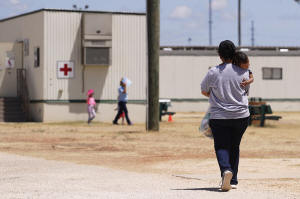Judge weighs Trump administration's request to end protections for
immigrant children
[August 09, 2025]
By VALERIE GONZALEZ
McALLEN, Texas (AP) — A judge on Friday was considering a Trump
administration request to end a decades-old policy on protections for
immigrant children in federal custody that the government says is
inhibiting its immigration crackdown.
The administration asked U.S. District Judge Dolly Gee in Los Angeles
during a hearing to dissolve the policy, which limits how long Customs
and Border Protection can hold immigrant children and requires them to
be kept in safe and sanitary conditions.
Gee, who oversees what is known as the Flores agreement, expressed
skepticism at the government’s request but did not immediately issue a
ruling. It was not clear how soon she will rule.
The judge pressed government attorney Joshua McCroskey on why President
Donald Trump's administration was holding children at the border for
longer than the 72 hours laid out in the agreement when border arrests
have reached record lows. She said it seems like conditions should be
improving but they “are deteriorating.”
“It seems counterintuitive that should happen unless it’s willful,” said
Gee, who was nominated to the court by President Barack Obama.
McCroskey said some children are being held for longer because Trump as
part of his crackdown ended the Biden administration's policy that
allowed expedited releases of immigrants. McCroskey also pointed to
logistical challenges that resulted from the closure of temporary
facilities that were set up under President Joe Biden to handle an
influx of immigrants.
In May, CBP held 46 children over a week, including six children held
for over two weeks and four children held 19 days, according to data
revealed in a court filing. In March and April, CPB reported that it had
213 children in custody for more than 72 hours. That included 14
children, including toddlers, who were held for over 20 days in April.
Advocates for immigrant children asked the judge to keep protections and
oversight in place and submitted accounts from immigrants in Texas
family detention centers who described adults fighting children for
clean water, despondent toddlers and a child with swollen feet who was
denied a medical exam. The advocates also want the judge to expand
independent monitoring.
“I have met children who have spent days in jail cells with barely more
than ramen noodles to eat, lights on day and night, no sunlight or
access to the outside world and the indignity of using the restroom in
front of guards. On top of that trauma — then to be flown to family
detention and locked up with no end in sight? It is truly shameful,”
Leecia Welch, the deputy legal director at Children’s Rights, said in an
interview after the hearing.

[to top of second column]
|

Immigrants seeking asylum walk through the ICE South Texas Family
Residential Center in Dilley, Texas, on Aug. 23, 2019. (AP
Photo/Eric Gay, File)

The Flores agreement, named for a teenage plaintiff, was the result
of over a decade of litigation between attorneys representing the
rights of immigrant children and the U.S. government over widespread
allegations of mistreatment in the 1980s. It governs the conditions
for all immigrant children in U.S. custody, including those
traveling alone or with their parents.
In its written motion, the Trump administration said the government
has made substantial changes since the agreement was formalized in
1997, creating standards and policies governing the custody of
immigrant children that conform to legislation and the agreement.

The administration is looking to expand immigration detention space,
including by building more centers like one in Florida dubbed
“Alligator Alcatraz,” where a lawsuit alleges detainees’
constitutional rights are being violated. In court, an attorney for
the government, Tiberius Davis, acknowledged that the agreement
hampers the administration's efforts, even though Trump’s tax and
spending bill provided billions to build new immigration facilities.
Davis said the bill gives the government authority to hold families
in detention indefinitely. "But currently under the Flores
settlement agreement, that’s essentially void,” he said.
The Biden administration successfully pushed to partially end the
agreement last year. Gee ruled that special court supervision may
end when the children are transferred from CPB custody to the
Department of Health and Human Services. But she carved out
exceptions for certain types of facilities for children with more
acute needs.
All contents © copyright 2025 Associated Press. All rights reserved |